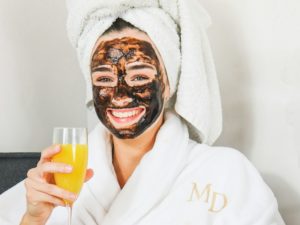A Complete Guide to Mixing Skincare Ingredients – What works well together and what to avoid!
We are no stranger to the importance of skincare at this point.

Everyone has skin and everyone should support the skin you’re in to promote its regular function. It’s not just for makeup gurus, not just for one gender, it’s exclusive af.
That being said, there are so many options? So many ingredients? What do?
Some ingredients are bound to help each other, while others butt heads like crazy! Some are even dangerous to mix!
Find out the answer to questions like “what active skincare ingredients can you mix?”, “what skincare ingredients cannot be used at the same time?”, and much more below!
What is skincare?
Skincare is simply the act of using ingredients to support and treat the skin.
This can be done through a variety of products and practices, and it does not look the same for every person.
Something as simple as sunscreen is skin care.
What does a basic skincare routine look like?
Here is a basic skincare routine everyone should have:
In the morning
- Cleanse your face (optional) – Some people only cleanse their face at night and that’s ok! See what works for your skin
- Use a moisturizer – even people with oil-prone skin benefit from a moisturizer. Oil production may be due to the skin overcompensating for a lack of moisture.
- SPF – If nothing else, use sun protection in the form of a sunscreen
At night
- Cleanse your face (not optional) – even if you use no makeup, you’re gonna want to remove the sunscreen, dust, dirt, and any other stressor you cannot see from your face.
- Treat (optional) – any skin concern should be treated now. This can be skipped if your moisturizer has ingredients that already target areas of concern.
- Moisturize – everyone needs a moisturizer here! Some individuals choose to lock everything with a facial oil afterwards too. Remember, the skin repairs itself most at night.
What skincare ingredients can you mix?
Here are the most popular skincare ingredients you can mix well!

SPF and Everything else
No really, SPF is important for daily use and is one of the best ways to protect the skin and prevent signs of aging.
SPF is particularly important if you use retinol or exfoliating ingredients, as this can make the skin more sensitive and prone to burning.
SPF should be used after your final moisturizing step and before any makeup. There are even ways to apply SPF on top of makeup, such as powder SPF or sprays.
AHA and BHA (but if and only if…)
AHA (alpha-hydroxy acids) and BHA (beta-hydroxy acids) are those chemical exfoliating ingredients that help to remove dead skin cells and restore the skin.
Common examples of AHA are glycolic acid and lactic acid. The most common BHA is salicylic acid.
AHA and BHA penetrate in different ways, so if it is formulated into one product with proper percentages, they can be paired.
Over-exfoliating may dry individuals out, so remember to rehydrate. If worried, look for products with only using one, before trying a product that contains both.
Hyaluronic Acid and AHA/BHA
Hyaluronic acid is a humectant that draws in moisture and is not an acid in the sense that it doesn’t exfoliate.
It is a good follow-up to exfoliating acids like AHAs and BHAs (glycolic, lactic, and salicylic acids). These exfoliating acids clear the skin and allow it to absorb products well.
Vitamin C and Hyaluronic Acid
Vitamin C and hyaluronic acid are two ingredients that work well together, increasing the effectiveness of both.
They can both brighten and hydrate, with vitamin c allowing for greater hyaluronic acid absorption, visibly decreasing signs of aging and protecting the skin.
Vitamin C and E
Both are rich in antioxidants and can protect the skin from aggressors, stressors, and pollutants. They can help stabilize each other as they are absorbed in different ways.
Make sure you use vitamin c before using vitamin e, as vitamin c is water-soluble and vitamin e is oil soluble.
Retinol and Hyaluronic Acid
Many retinol products are formulated to include hyaluronic acid, as hyaluronic acid is a gentle, moisturizing ingredient.
If you use retinol, be sure to follow with a humectant like hyaluronic acid to ensure moisture is preserved, and finish with a moisturizer.

What skincare ingredients should you avoid using together?
Here are some combinations that are a recipe for disaster!
Oil-based products and Water-based products
Now, this isn’t necessarily true as we saw in Vitamin C and Vitamin E.
Oil does repel water though, so make sure you use water-based products first, allow them to absorb, and then use oil-based products.
Retinol and Vitamin C
Retinol and vitamin c work at different pH levels, so using them at the same time decrease the effectiveness of both. If anything, use vitamin c in the day and retinol at night.
If both are a nighttime routine step, use vitamin c first then wait at least 30 minutes before applying retinol.
AHA/BHA and Vitamin C
Vitamin c and AHA/BHA may be too harsh for the skin, as all these acids may throw off the balance of your skin pH.
Remember, over-exfoliating can be just as bad if not worse than not exfoliating.
Use vitamin c during the day and save the AHA/BHA for the night.
Vitamin C and Niacinamide
Used together, these ingredients may be over-sensitizing and may cause acne or breakouts.
If used in the same routine, wait at least 15 minutes in-between applications.
Retinol and AHA/BHA
Absolutely never mix these!
These would leave your skin dry, irritated, and damaged as both of these can cause exfoliation.
Retinol and Benzoyl Peroxide
Again, as both of these are exfoliating, you shouldn’t mix them as they can damage the skin when used together.
AHA/BHA and Niacinamide
These two products work at different pH levels.
When used together, the effectiveness of both is canceled out.
The Takeaway
Skincare can be tricky, with all the different ingredients, it can seem overwhelming.
Doing due diligence is important, and if you understand more about the products, you can find the best what to target skin concerns and make the most of your routine.
Remember, skin care is not a chore, it is a choice! It is not about perfect it is about progress.





